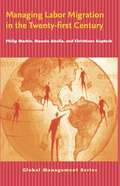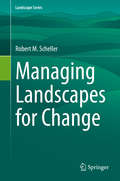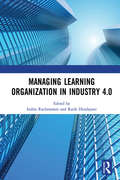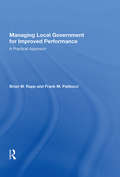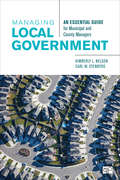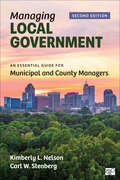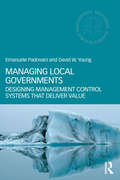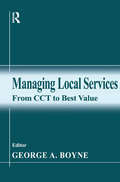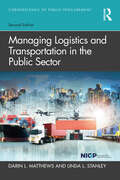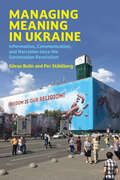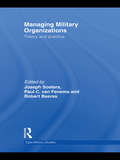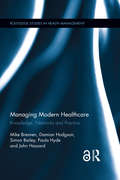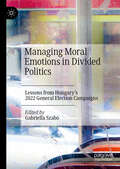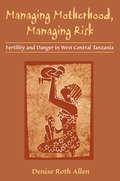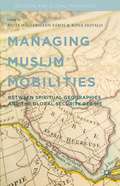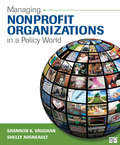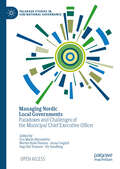- Table View
- List View
Managing Labor Migration in the Twenty-first Century
by Philip Martin Manolo Abella Christiane KuptschWhy have ninety million workers around the globe left their homes for employment in other countries? What can be done to ensure that international labor migration is a force for global betterment? This groundbreaking book presents the most comprehensive analysis of the causes and effects of labor migration available, and it recommends sensible, sustainable migration policies that are fair to migrants and to the countries that open their doors to them. The authors survey recent trends in international migration for employment and demonstrate that the flow of authorized and illegal workers over borders presents a formidable challenge in countries and regions throughout the world. They note that not all migration is from undeveloped to developed countries and discuss the murky relations between immigration policies and politics. The book concludes with specific recommendations for justly managing the world's growing migrant workforce.
Managing Land Use Conflicts: Case Studies in Special Area Management
by David J. Brower Daniel S. CarolThis work contains a series of case studies of the planning phenomenon that has become known as Special Area Management (SAM)--those areas so naturally valuable, so important for human use, so sensitive to impact, or so particular in their planning requirements as to need special management treatment. Based on an examination of the SAMs, this work integrates various aspects of the process of their planning and management and proposes policy and administrative guidelines to improve SAMs as a planning tool.
Managing Landscapes for Change (Landscape Series #27)
by Robert M. SchellerThis book discusses how future landscapes will be shaped by pervasive change and where, when, and how society should manage landscapes for change. Readers will learn about the major anthropogenic drivers of landscape change, including climate change and human induced disturbance regimes, and the unique consequences that multiple and simultaneously occurring change agents can have on landscapes. The author uses landscape trajectories as a guide to selecting the appropriate course of action, and considers how landscape position, inertia, and direction will determine landscape futures. The author introduces the concept of landscapes as socio-technical-ecological systems (STES), which combines ecological and technological influences on future landscape change and the need for society to acknowledge both when considering landscape management. Thinking beyond solutions, the author identifies barriers to managing landscapes for change including the cost, cultural identity of local populations, and the fear of taking action under uncertain conditions. Nevertheless, processes, tools, and technologies exist for overcoming social and ecological barriers to managing landscapes for change, and continued investment in social and scientific infrastructure holds out hope for maintaining our landscape values even as we enter an era of unprecedented change and disruption.
Managing Leader Selection in European Political Parties (Palgrave Studies in Political Leadership)
by Nicholas Aylott Niklas BolinThis book explores the varying ways in which political parties in Europe make arguably their most important decisions: the selection of their leaders. The choice shapes the representation of a party externally. It also influences the management of internal conflict, because there will always be some disagreement about the party’s direction. The rules of selection will naturally affect the outcome. Yet there is more to it than rules. Sometimes the process is open and fiercely contested. Sometimes the field of potential leaders is filtered even before the decision reaches the selectorate – the organ that, according to party statutes, formally makes the appointment. The selectorate might have only a single candidate to ratify, a so-called ‘coronation’. The book presents a framework for analysing both the formal and informal sides of leader selection, and hones the framework through its application in a series of case studies from nine European countries.
Managing Learning Organization in Industry 4.0: Proceedings of the International Seminar and Conference on Learning Organization (ISCLO 2019), Bandung, Indonesia, October 9-10, 2019
by Ratih Hendayani Indira RachmawatiThe proceedings of the 6th International Seminar & Conference on Learning Organization (ISCLO) with the theme “Enhancing Organization’s Competitiveness through Knowledge Sharing and Learning Culture in the 4.0 Era” provides research results from scientists, scholars and practitioners, exchanging information and discussing the latest issues related to topics such as Marketing, Human Resources, Industrial Behavior and Knowledge Management, Entrepreneurship and Strategic Management, IT and Operations Management Economics, Financial and Accounting. These papers will contribute to the enhancement of the organization's competitive advantage with technology serving as a supporting system for knowledge sharing and learning culture. These proceedings will be of interest to scholars, practitioners, government and the industry employees, taking part in increasing Global Competitiveness in the coming years.
Managing Legal Uncertainty: Elite Lawyers in the New Deal
by Ronen ShamirWith the New Deal came a dramatic expansion of the American regulatory state. Threatening to undermine many of the traditional roles of the legal system and its actors by establishing a system of administrative law, the new emphasis on federal legislation as a form of social and economic planning ushered in an era of "legal uncertainty." In this study Ronen Shamir explores how elite corporate lawyers and the American Bar Association clashed with academic legal realists over the constitutionality of the New Deal's legislative program.Applying the insights of Weber and Bourdieu to the sociology of the legal profession, Shamir shows that elite members of the bar had a keen self-interest in blocking the expansion of administrative law. He dismisses as oversimplified the view that elite lawyers were "hired guns" who argued that New Deal legislation was unconstitutional solely because of their duty to represent their capitalist clients. Instead, Shamir suggests, their alignment with the capitalist class was an incidental result of their attempt to articulate their vision of the law as scientific, apolitical, and judicially oriented--and thereby to defend their own position within the law profession. The academic legal realists on the other side of the constitutional debates criticized the rigidity of the traditional judicial process and insisted that flexibility of interpretation and the uncertainty of legal outcomes was at the heart of the legal system. The author argues that many legal realists, encouraged by the experimental nature of the New Deal, seized an opportunity to improve on their marginal status within the legal profession by moving their discussions from academic circles to the national policy agenda.
Managing Local Government For Improved Performance: A Practical Approach
by Brian W. RappAfter working for nearly three years to improve the performance of the government of Flint, Michigan—and discovering that there was no comprehensive work on the subject of local-government management to refer to—Brian Rapp and Frank M. Patitucci felt a personal as well as a professional need to write a book that would help them understand their successes and failures, and that would help others do a better job in similar situations. The result, this book, is unique both in its approach and in its presentation. The authors, establishing a conceptual framework within which to understand their subject, use Flint as a case city to examine the practical impact of factors affecting city government, and they indicate the major standards and criteria that should be applied in evaluating that impact. Although they recognize that within each city there are unique conditions that make a blanket prescription impossible, the authors are nevertheless convinced that many individuals both in and out of government can do something to improve the performance of their city government, and they have set out to help these individuals understand, in the most concrete terms possible, how they might go about it.
Managing Local Government: An Essential Guide for Municipal and County Managers
by Carl W. Stenberg Kimberly L. NelsonManaging Local Government: An Essential Guide for Municipal and County Managers offers a practical introduction to the changing structure, forms, and functions of local governments. Taking a metropolitan management perspective, authors Kimberly Nelson and Carl W. Stenberg explain U.S. local government within historical context and provide strategies for effective local government management and problem solving. Real-life scenarios and contemporary issues illustrate the organization and networks of local governments; the roles, responsibilities, and relationships of city and county managers; and the dynamics of the intergovernmental system. Case studies and discussion questions in each chapter encourage critical analysis of the challenges of collaborative governance. Unlike other books on the market, this text’s combined approach of theory and practice encourages students to enter municipal and county management careers and equips them with tools to be successful from day one.
Managing Local Government: An Essential Guide for Municipal and County Managers
by Carl W. Stenberg Kimberly L. NelsonManaging Local Government: An Essential Guide for Municipal and County Managers offers a practical introduction to the changing structure, forms, and functions of local governments. Taking a metropolitan management perspective, authors Kimberly Nelson and Carl W. Stenberg explain U.S. local government within historical context and provide strategies for effective local government management and problem solving. Real-life scenarios and contemporary issues illustrate the organization and networks of local governments; the roles, responsibilities, and relationships of city and county managers; and the dynamics of the intergovernmental system. Case studies and discussion questions in each chapter encourage critical analysis of the challenges of collaborative governance. Unlike other books on the market, this text’s combined approach of theory and practice encourages students to enter municipal and county management careers and equips them with tools to be successful from day one.
Managing Local Government: An Essential Guide for Municipal and County Managers
by Carl W. Stenberg Kimberly L. NelsonManaging Local Government: An Essential Guide for Municipal and County Managers, 2nd Edition, covers the basics of the local government management curriculum with a regional approach that examines the local governmental structural forms, administrative functions, and financial considerations inherent to the metropolitan environment. To prepare the next generation of local leaders, authors Kimberly Nelson and Carl Stenberg incorporate real-life scenarios, case studies, and class discussion questions to help students understand contemporary issues.
Managing Local Government: An Essential Guide for Municipal and County Managers
by Carl W. Stenberg Kimberly L. NelsonManaging Local Government: An Essential Guide for Municipal and County Managers, 2nd Edition, covers the basics of the local government management curriculum with a regional approach that examines the local governmental structural forms, administrative functions, and financial considerations inherent to the metropolitan environment. To prepare the next generation of local leaders, authors Kimberly Nelson and Carl Stenberg incorporate real-life scenarios, case studies, and class discussion questions to help students understand contemporary issues.
Managing Local Governments: Designing Management Control Systems that Deliver Value (Masters in Public Management)
by David W. Young Emanuele PadovaniLocal Government is an area where management skills are tested to the extreme. With political considerations evident both locally and nationally, managing resources can be complex and subject to change. This book introduces new concepts and new ways of doing business that can greatly enhance the value of the services a local government provides to its citizens, without putting a greater financial burden on taxpayers. Padovani and Young present out-of-the-box thinking based on solid research and experience to discuss topics such as: Incorporating outcome indicators into strategic planning and budgeting Building a LG’s budget with ‘cost drivers’ Expanding the concept of ‘enterprise funds’ Assessing and better managing the risk associated with outsourcing Using the concept of ‘shadow pricing’ to compare public with private sector costs for services This book is a must-read for students of public administration and management, senior and middle managers in local governments around the world, and citizens who are concerned with more effective management of their local government’s programs and services. A list of suggested extra case studies for each chapter, and a description of the process to follow for ordering them, may be obtained by sending an email to CrimsonCenter@cs.com. You should request the document "Case Study Suggestions for Managing Local Governments".
Managing Local Services: From CCT to Best Value
by George A. BoyneThe Labour Government has introduced legislation to place a new duty of Best Value on local authorities, and abolish compulsory competitive tendering. This work identifies the differences between the two systems and evaluates the development of the new regime, using case studies.
Managing Logistics and Transportation in the Public Sector (Cornerstones of Public Procurement)
by Darin L. Matthews Linda L. StanleyManaging Logistics and Transportation in the Public Sector, Second Edition thoroughly examines the world of transportation as it relates to public procurement, stressing the importance of not only procuring the right goods, materials, and services, but also ensuring their proper delivery to their final destination. Designed to educate the public procurement professional on ways to realize enhanced cost savings, it offers an introduction to the history of transportation, as well as industry terminology and accepted practices. Authors Darin Matthews and Linda Stanley explore recent transportation industry evolutions, including the development of important technologies like package tracing, delivery notification, and drone delivery, and ways to successfully integrate this technology. Sustainability in transportation—including product packaging, material reuse, and reduced emissions for delivery vehicles— is likewise examined. Through the use of case studies and transportation industry resources, Managing Logistics and Transportation in the Public Sector, Second Edition offers a complete package for professionals looking to enhance their knowledge of logistics and transportation, as well as for university courses on transportation, supply chain management, and public procurement.
Managing Logistics and Transportation in the Public Sector (Cornerstones of Public Procurement)
by Darin L. Matthews Linda L. StanleyManaging Logistics and Transportation in the Public Sector, Second Edition thoroughly examines the world of transportation as it relates to public procurement, stressing the importance of not only procuring the right goods, materials, and services, but also ensuring their proper delivery to their final destination. Designed to educate the public procurement professional on ways to realize enhanced cost savings, it offers an introduction to the history of transportation, as well as industry terminology and accepted practices. Authors Darin Matthews and Linda Stanley explore recent transportation industry evolutions, including the development of important technologies like package tracing, delivery notification, and drone delivery, and ways to successfully integrate this technology. Sustainability in transportation—including product packaging, material reuse, and reduced emissions for delivery vehicles— is likewise examined. Through the use of case studies and transportation industry resources, Managing Logistics and Transportation in the Public Sector, Second Edition offers a complete package for professionals looking to enhance their knowledge of logistics and transportation, as well as for university courses on transportation, supply chain management, and public procurement.
Managing Meaning in Ukraine: Information, Communication, and Narration since the Euromaidan Revolution
by Goran Bolin Per StahlbergAn in-depth look at Ukraine&’s attempts to shape how it is perceived by the rest of the world.During times of crisis, competing narratives are often advanced to define what is happening, and the stakes of information management by nations are high. In this timely book, Göran Bolin and Per Ståhlberg examine the fraught intersection of state politics, corporate business, and civil activism to understand the dynamics and importance of meaning management in Ukraine. Drawing on fieldwork inside the country, the authors discuss the forms, agents, and platforms within the complex political and communicative situation and how each articulated and acted upon perceptions of the propaganda threat.Bolin and Ståhlberg focus their analysis on the period between 2013 and 2022, when political tensions, commercial dynamics, and new communication technologies bred novel forms of information management. As they show, entities from governments and governmental administration to commercial actors, entrepreneurs, and activists formed new alliances in order to claim a stake in information policy. Bolin and Ståhlberg also explore how the various agents engaged in information management and strove to manage meaning in communication practice; the communicative tools they took advantage of; and the subsequent consequences for narrative constructions.
Managing Military Organizations: Theory and Practice (Cass Military Studies)
by Joseph SoetersThis book deals with the processes and theories involved in managing military organisations in both peacetime and crisis conditions. Examining the challenges faced by policymakers and military commanders in conducting military operations, this book considers the benefits of conventional management and organisation theory for the military. At the same time, these essays recognise that the military should be considered as a highly individual organisation, operating in exceptional circumstances. This awareness of the differences between the military and other organisations generates important lessons not only for the military but also for general organisations as it teaches them how to cope in exceptional, ‘hyper’ conditions. These theoretical lessons are illustrated by case studies and experiences from recent military operations, such as those in Iraq and Afghanistan. This book will be of great interest to students of military studies, security studies and organizational studies. Joseph Soeters chairs the department of management and organization studies and defence economy at the Netherlands Defense Academy and he is a professor in organizational sociology at Tilburg University. Paul. C. van Fenema is an associate professor of organization studies at the Netherlands Defence Academy and Tilburg University. Robert Beeres is an associate professor in the field of defence accounting and control (business administration) at the Netherlands Defence Academy and at Nyenrode Business School.
Managing Modern Healthcare: Knowledge, Networks and Practice (Routledge Studies in Health Management #2)
by John Hassard Simon Bailey Paula Hyde Mike Bresnen Damian HodgsonUntil now, research has given us only a limited understanding of how managers actually make sense of and apply management knowledge; how networks of interaction amongst managers help or hinder processes of knowledge diffusion and the sharing of best practice; and how these processes are all influenced both by the organisations in which managers act and by the professional communities of practice they belong to. Managing Modern Healthcare fills these important gaps in our understanding by drawing upon an in-depth study of management networks and practice in three healthcare organisations in the UK. It draws from the primary research a number of important and grounded lessons about how management networks develop and influence the spread of management knowledge and practice; how management training and development relates to the needs of managers facing challenging conditions; and how those conditions are themselves shaping the nature of management in healthcare. This book reveals how managers in practice are responding to the many contemporary challenges facing healthcare (and the NHS in particular) and how they are able or not to effectively exploit sources of knowledge, learning and best practice through the networks of practice they engage in to improve healthcare delivery and healthcare organisational performance. Managing Modern Healthcare makes a number of important theoretical contributions as well as practical recommendations. The theoretical and empirical contributions the book makes relate to wider work on networks and networking, management knowledge, situated learning/communities of practice, professionalization/professional identity and healthcare management more generally. The practical contribution comes in the form of recommendations for healthcare management practitioners and policy makers that are intended to impact upon and help enhance healthcare management delivery and performance.
Managing Moral Emotions in Divided Politics: Lessons from Hungary’s 2022 General Election Campaigns
by Gabriella SzabóThis book explores how to identify and understand moral emotions—shame, guilt, pride, and hubris—in political messages and news media. Recognizing these emotions is crucial for assessing morality's role in public discourse, particularly as moral debates have deepened public divides on issues like abortion, migration, LGBTQ+ rights, and freedom of speech. These debates fuel political struggles between groups with different social values and moral intuitions, especially during election campaigns where moral conflicts are used to distinguish opposing forces. In these moral conflicts, each ideological camp seeks to affirm its legitimacy while questioning its opponents' reputations. Thus, understanding morality is vital for those interested in contemporary public discourses in divided nations. This book stimulates discussion on emotion-based morality, moral language, and discursive moral regulation in politics. It offers innovative analytical frameworks to study how political communication contributes to public moralization. The book combines descriptive, explorative, and comparative approaches to summarize findings from mixed-method analyses (qualitative and quantitative, textual and visual, content and survey) of moral emotional messages and media portrayals of prime minister candidates during Hungary's 2022 General Election Campaigns. Hungary serves as an illustrative case due to increasing concerns about the moral status of its political elite and extreme hostility between political blocs, leading to polarized views on governance. This book will be of interest to academics specializing in empirical moral studies and investigating public discussions in contentious and polarized societies.
Managing Motherhood, Managing Risk: Fertility and Danger in West Central Tanzania
by Denise Roth AllenAn investigation of the consequences resulting from fertility-related development interventions in Tanzania
Managing Muslim Mobilities
by Anita H. Fábos Riina IsotaloFábos and Isotalo address the issue of forced migration and mobility in the Muslim world. Their work explores the tensions between Muslim religious conceptions of space and place and new policies of 'migration management' and secure borders.
Managing Natural Resource Conflicts with Participatory Mapping and PGIS Applications
by Peter A. KyemThis book integrates spatial analysis into the study and management of conflicts, and offers a model in conflict studies that incorporates theoretical explanations of conflict, its causes, and impacts, with a geospatial strategy for intervening in disputes over allocation and use of natural resources (connects theory and practice). Alongside a theoretical analysis of resource conflicts and an account of Participatory Mapping and PGIS development, this book provides a case study of GIS applications in conflict mediation. The book also lays out a practical and straightforward demonstration of PGIS applications in conflict management using a real-world case study, and traces the Participatory Mapping and PGIS movements’ evolution, compares PPGIS and PGIS practices, and makes distinctions between traditional GIS applications and PGIS practice. The approach embodies the enhanced use of spatial information and media, sets of tools for analyzing, mapping, and displaying spatial data and a platform for participatory discussions that enhances consensus-building. The book, therefore, contributes to the search for novel approaches for managing current and emerging conflicts. With this book, resource managers, development practitioners, students, and scholars of Participatory Mapping and PGIS applications and conflict studies will be equipped with the principles, skills, and the tools they need to manage non-violent resource conflicts and keep the disputes from slipping into violence. The book will also be a valuable text for basic and advanced studies in Participatory Mapping and PGIS applications, Conflict Resolution and Conflict Management.
Managing New Security Threats in the Caribbean
by Jerome Teelucksingh Georgina Chami Marlon AnatolThis book examines non-traditional forms of security and expands the notion of security to include non-state actors and non-human actors. With a wide-ranging look into some of the ‘new’ security threats facing state and non-state actors today, this book is designed to specifically offer new angles on tackling these threats in the Caribbean region. It explores issues relating to viruses, war and conflict, migration, geopolitics, climate change and terrorism through multi- and interdisciplinary perspectives on global (in-)securities. Each chapter clearly elucidates the connectedness of these non-traditional threats, drawing on a remarkable number of the most recent reports and scholarly works. Most importantly, there is a lack of Caribbean studies in the security themes that are studied. This book is a much-needed and timely addition to intellectual thought on Caribbean security in an increasingly fragmented world. It will be of great interest to students of international security studies, human security, global politics, and international relations.
Managing Nonprofit Organizations in a Policy World
by Shannon K. Vaughan Shelly ArsneaultIf nonprofits influence policy, make policy, are affected by policy, and are subject to policy, then shouldn′t every nonprofit manager fully understand the policy world in which they operate? In explicitly tying the policy realm to management skills, Vaughan and Arsneault′s foundational book sheds new light on how nonprofit managers can better navigate policymaking and regulatory contexts to effectively lead their organizations. Vaughan and Arsneault provide a comprehensive overview of the nonprofit sector and the policy environment, with a focus on skills and strategies managers can use to advance the causes of their organizations. Abundant examples and rich case studies explore the complexity of the policy-nonprofit relationship and highlight both management challenges and successes. While coverage of the nuts-and-bolts is in here, what sets this book apart is tying everyday management to the broader view of how nonprofits can thrive within the policy ecosystem.
Managing Nordic Local Governments: Paradoxes and Challenges of the Municipal Chief Executive Officer (Palgrave Studies in Sub-National Governance)
by Morten Balle Hansen Eva Marín Hlynsdóttir Anna Cregård Dag Olaf Torjesen Siv SandbergThis open access book examines the roles of municipal chief executive officers in Denmark, Finland, Iceland, Norway and Sweden. Whilst it has long been recognised that local authorities in these countries are often more autonomous than most other local authorities around the world, we still lack an integrated overview of leadership in Nordic local government, and the development of its top administrative management. This book ameliorates this lack of knowledge by providing a thorough, extensive and updated assessment of the role of municipal chief executive officers in the five Nordic states, as well as their interactions and relations with internal and external actors. Comparative in nature, it will appeal to all those interested in local and urban governance, public administration, public management, and leadership studies.
